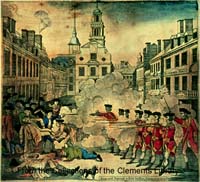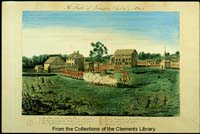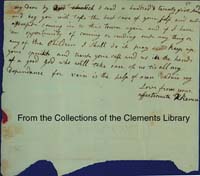Take the Money and Run
April/May 1775 -- Rachel Revere
to Paul Revere
 Paul
Revere was one of the original members of the Sons of Liberty rebel organization
and played a large role in popularizing resistance to the Stamp Act and
the Boston Massacre through his widely circulated engravings of the events.
In addition to his silversmith and engraving skills, Revere was also an
accomplished horse rider and frequently rode as a courier between rebel
leaders.
Paul
Revere was one of the original members of the Sons of Liberty rebel organization
and played a large role in popularizing resistance to the Stamp Act and
the Boston Massacre through his widely circulated engravings of the events.
In addition to his silversmith and engraving skills, Revere was also an
accomplished horse rider and frequently rode as a courier between rebel
leaders.

On April 18, 1775, Revere learned of General
Gage's plans for a midnight raid on the town of Concord to seize the rebel
colonists' store of weapons. Revere immediately set out on horseback
to warn patriot leaders John Hancock and Sam Adams in Lexington that the
British were marching to seize rebel leaders and weapons. After delivering
his message in Lexington, Revere continued on to Concord where he was captured
and questioned by British troops. In their hurry to return to Concord,
the British officers decided to release Revere. However, they took
his horse, forcing him to return to Lexington on foot.
 Paul
Revere's wife, Rachel,
sent this concerned letter to her husband as he tried to make his way home,
horseless and without funds. Rachel entrusted the letter and 125 pounds
to Benjamin
Church to deliver to her husband. Church was a member of the
Provincial Congress of Massachusetts and the surgeon general of Washington's
troops. Rachel and the rebel leaders did not know that Church
was also a spy for the British and reported to General Gage the movements
and strategies of the rebel forces. Instead of giving the letter
to Paul Revere, Church delivered this letter to General Gage. No
mention was ever made of the money Rachel sent in Church's report to Gage
and it is presumed that he kept the money. Church was eventually
apprehended in October of 1775 when his mistress was captured secreting
one of Church's cipher
letters to General Gage. Church was imprisoned until 1777 when he
was allowed to set sail to the West Indies. His ship was declared
lost at sea.
Paul
Revere's wife, Rachel,
sent this concerned letter to her husband as he tried to make his way home,
horseless and without funds. Rachel entrusted the letter and 125 pounds
to Benjamin
Church to deliver to her husband. Church was a member of the
Provincial Congress of Massachusetts and the surgeon general of Washington's
troops. Rachel and the rebel leaders did not know that Church
was also a spy for the British and reported to General Gage the movements
and strategies of the rebel forces. Instead of giving the letter
to Paul Revere, Church delivered this letter to General Gage. No
mention was ever made of the money Rachel sent in Church's report to Gage
and it is presumed that he kept the money. Church was eventually
apprehended in October of 1775 when his mistress was captured secreting
one of Church's cipher
letters to General Gage. Church was imprisoned until 1777 when he
was allowed to set sail to the West Indies. His ship was declared
lost at sea.
Next Story |
|
|
|
|
Letters | Stories | Methods | People | Routes | Timeline | Home
Clements Library | Sir Henry Clinton Collection | Teachers' Lounge | About the Project | Bibliography